| Revision as of 02:07, 1 February 2009 editMales (talk | contribs)672 edits and Bulgarian ritual, too← Previous edit | Revision as of 03:42, 5 June 2009 edit undoJ04n (talk | contribs)Autopatrolled, Administrators162,685 editsm Repairing link to disambiguation page - You can help!Next edit → | ||
| Line 6: | Line 6: | ||
| A similar Romanian rain ritual is the ]. | A similar Romanian rain ritual is the ]. | ||
| The name is probably derived from ], which in its turn is a Slavic (south slavic) goddess, or as Sorin Paliga suggests, is a divinity from the local ] substratum<ref name="Sorin">Sorin Paliga: "Influenţe romane și preromane în limbile slave de sud" </ref>. | The name is probably derived from ], which in its turn is a Slavic (south slavic) goddess, or as Sorin Paliga suggests, is a divinity from the local ] substratum<ref name="Sorin">Sorin Paliga: "Influenţe romane și preromane în limbile slave de sud" </ref>. | ||
| Like the ] (''dudula'', ''dudulica'', ''dodolă'' in Romanian, ''dudulë'' in Albanian, ''tuntule'' in Greek, ''dudulya'' and ''didilya'' in South Slavic languages), which is another name for the same custom holding similar rituals, compared by Decev <ref>D. Decev, ''Die thrakischen Sprachreste'', Wien: R.M. Rohrer, 1957, pages 144, 151</ref> with ] anthroponyms (]s) and toponyms (place names) (such as ''Doidalsos'', ''Doidalses'', ''Dydalsos'', ''Dudis'', ''Doudoupes'', etc.) and argued by Paliga to be of Thracian origin, the Paparuda is found only at ] (''păpărudă''), ] (''pirpirună'') and ] (''peperuda'', ''perperuna'')<ref name="Sorin"/>. | Like the ] (''dudula'', ''dudulica'', ''dodolă'' in Romanian, ''dudulë'' in Albanian, ''tuntule'' in Greek, ''dudulya'' and ''didilya'' in South Slavic languages), which is another name for the same custom holding similar rituals, compared by Decev <ref>D. Decev, ''Die thrakischen Sprachreste'', Wien: R.M. Rohrer, 1957, pages 144, 151</ref> with ] anthroponyms (]s) and toponyms (place names) (such as ''Doidalsos'', ''Doidalses'', ''Dydalsos'', ''Dudis'', ''Doudoupes'', etc.) and argued by Paliga to be of Thracian origin, the Paparuda is found only at ] (''păpărudă''), ] (''pirpirună'') and ] (''peperuda'', ''perperuna'')<ref name="Sorin"/>. | ||
| The name of ''Dodola'' is possibly cognate with the Lithuanian word for thunder: ''dundulis''<ref name="Sorin"/>. | The name of ''Dodola'' is possibly cognate with the Lithuanian word for thunder: ''dundulis''<ref name="Sorin"/>. | ||
Revision as of 03:42, 5 June 2009

Paparuda is a Romanian and Bulgarian rain ritual, probably of pagan origin, performed in the spring and in times of severe drought.
A girl, wearing a skirt made of fresh green knitted vines and small branches, sings and dances through the streets of the village, stopping at every house, where the hosts pour water on her. She is accompanied by the people of the village who dance and shout on the music. The custom has attributed a specific type of dance and a specific melody.
A similar Romanian rain ritual is the Caloian.
The name is probably derived from Perperuna, which in its turn is a Slavic (south slavic) goddess, or as Sorin Paliga suggests, is a divinity from the local Thracian substratum.
Like the Dodola (dudula, dudulica, dodolă in Romanian, dudulë in Albanian, tuntule in Greek, dudulya and didilya in South Slavic languages), which is another name for the same custom holding similar rituals, compared by Decev with Thracian anthroponyms (personal names) and toponyms (place names) (such as Doidalsos, Doidalses, Dydalsos, Dudis, Doudoupes, etc.) and argued by Paliga to be of Thracian origin, the Paparuda is found only at Romanians (păpărudă), Aromanians (pirpirună) and South Slavs (peperuda, perperuna).
The name of Dodola is possibly cognate with the Lithuanian word for thunder: dundulis.
References
- ^ Sorin Paliga: "Influenţe romane și preromane în limbile slave de sud" .pdf
- D. Decev, Die thrakischen Sprachreste, Wien: R.M. Rohrer, 1957, pages 144, 151
This Romania-related article is a stub. You can help Misplaced Pages by expanding it. |
This Bulgaria-related article is a stub. You can help Misplaced Pages by expanding it. |